 Are you tired of hiding your smile because of the gaps left by missing teeth? Are you frustrated with having to care for a denture? If so, then dental implants might be just the solution you’re looking for. As a permanent tooth replacement solution, dental implants can bring back any number of missing teeth with prosthetics that look, feel, and function exactly like the genuine article. If you’re interested in dental implants in Toronto, just call our team at LG Dental Centre to get started. Soon, you’ll have a wide, toothy grin just like you used to!
Are you tired of hiding your smile because of the gaps left by missing teeth? Are you frustrated with having to care for a denture? If so, then dental implants might be just the solution you’re looking for. As a permanent tooth replacement solution, dental implants can bring back any number of missing teeth with prosthetics that look, feel, and function exactly like the genuine article. If you’re interested in dental implants in Toronto, just call our team at LG Dental Centre to get started. Soon, you’ll have a wide, toothy grin just like you used to!
Why Choose LG Dental Centre for Dental Implants?
- Entire Dental Implant Treatment Completed In-House
- Bone Grafting Offered to Ensure Successful Results
- Flexible Dental Payment Options Available
What Are Dental Implants?
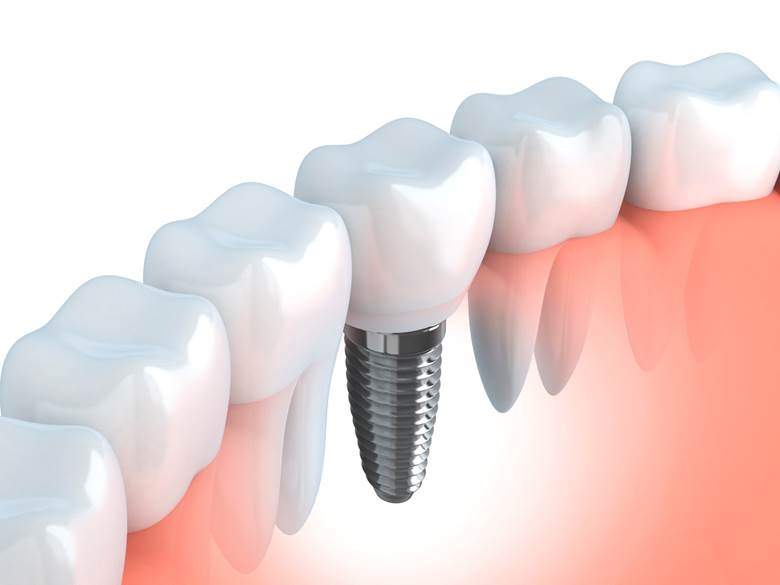
Dental implants themselves don’t particularly look like real teeth, but that’s because they replace the roots that are normally embedded in the jawbone. The implants are small titanium rods that are surgically positioned in the jaw where a natural tooth’s roots used to be. Then, the jawbone actually grows around the implant in a process called osseointegration. This essentially results in a new tooth root, which can support a dental crown, bridge, or denture on top that remains securely in place for years or even decades to come.
The 4-Step Dental Implant Process
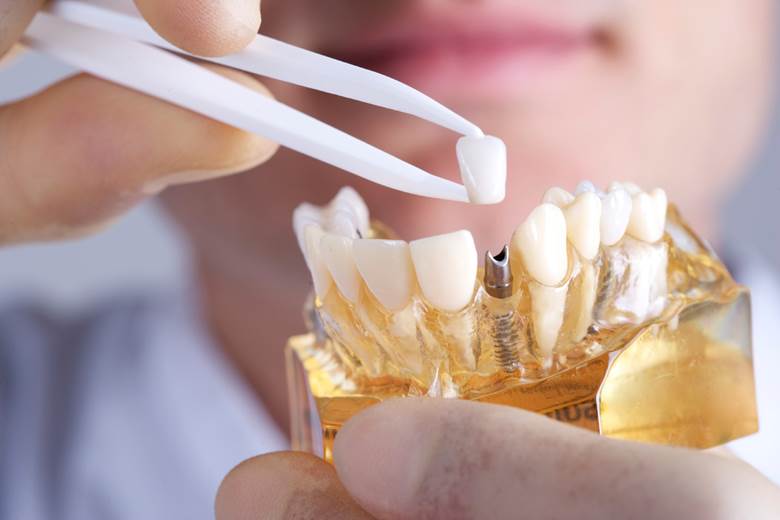
Dental implants are considered the gold standard of tooth replacement and for a good reason. Even though the process takes several months to complete, patients find the incredible benefits well worth the time and effort. At LG Dental Centre, we’re proud to be able to offer this top-tier treatment to you. While every patient’s treatment plan will look slightly different, there are four main steps you can expect regarding dental implants in Toronto.
Initial Dental Implant Consultation

The first step on your journey towards a complete and fully functioning smile is a consultation with our dentist. During this appointment, they will conduct an oral examination, review your dental health and medical history, ask about your goals to determine whether this treatment is right for you, and make sure you understand how dental implants work in Toronto. Based on the findings, they may need to perform some preliminary procedures (gum disease therapy, tooth extractions, bone grafting) to prepare your mouth.
Dental Implant Surgery
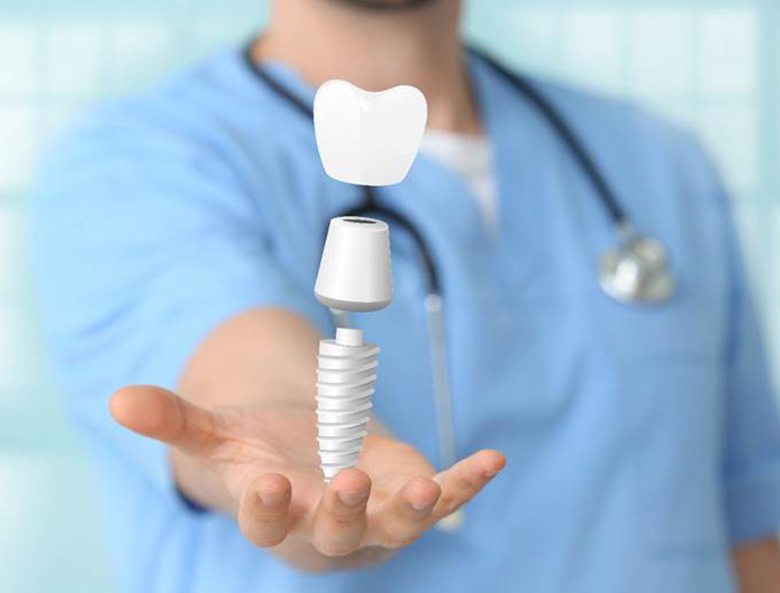
Our implant dentist in Toronto is trained to perform the entire treatment at our office location to ensure a top-notch result for your smile. In preparation for implant placement, they will numb the area so you’re completely comfortable during the procedure. Then, they will make small incisions in the gums, insert the implants at precise angles and locations in the jawbone, and suture your gums shut. Afterward, they will place a protective cap over the posts to keep your mouth safe.
Dental Implant Osseointegration & Abutment Placement
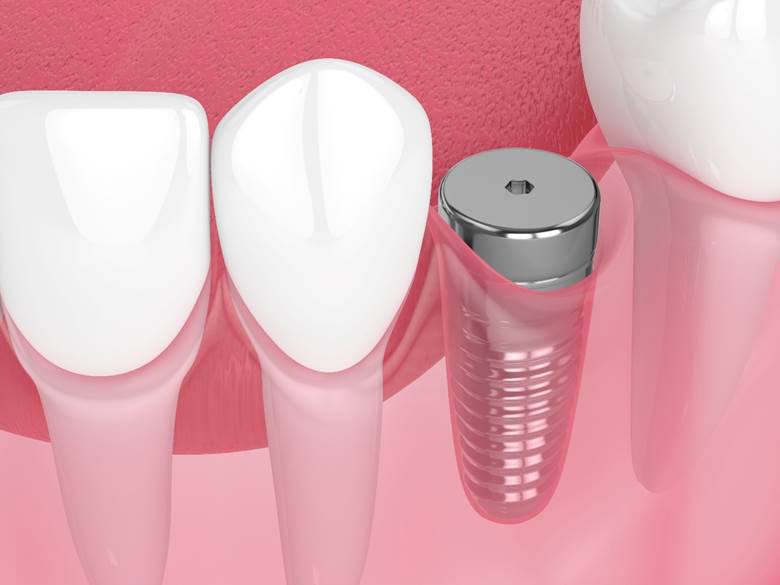
After approximately 3-6 months, the dental implant will integrate with your jawbone via a natural process called osseointegration. Once that step is complete, you’ll return to the office for a second, smaller surgery to place the abutments on top of the posts. While you heal, your final restorations will be made using impressions taken of your mouth.
Delivery of Dental Implant Restorations

A trusted dental laboratory will craft each dental implant restoration so that it fits perfectly inside your mouth. When it’s ready, we’ll call you back to the office and attach your crown, bridge, or denture to your abutments. Our dentist will make any final adjustments to ensure your new smile is exactly what you wanted. You’ll be ready to enjoy your newly rebuilt grin that same day!
Benefits of Dental Implants

One of the best methods to replace missing teeth is with dental implants. By surgically embedding titanium posts into your jawbone, you’ll be able to enjoy effective and long-lasting restorations for many years to come. They also offer numerous benefits that you won’t find with other options. If you schedule an initial consultation with our team at LG Dental Centre, we can discuss the details of this treatment and the best way we can help you achieve a full smile! Read on or feel free to reach out to us if you wish to learn more today!
Day-to-Day Benefits
Since you’ll need to use your teeth for eating, talking, and smiling daily, you can expect to appreciate some of the following freedoms with your dental implants:
- Drink your favorite beverages: Unlike other options, you won’t have to worry about your implants staining easily. This means you can enjoy your favorite beverages like coffee or red wine, as your restorations won’t be susceptible to warping from temperatures or discoloration.
- Munch on food without worry: Many patients with dental bridges or dentures sometimes need to be cautious with certain foods such as apples, steak, and corn on the cob. With dental implants, you can regain about 80% of your original biting power! You’ll be able to eat all your favorite meals like before.
- Boosts your confidence: Your dental implants will look and feel like natural teeth. This means you won’t have to worry about them falling out or being noticeable to others whenever you smile. You’ll feel more comfortable showing off your new pearly whites!
Health Benefits
Other than improving your appearance, dental implants offer several important health benefits, including:
- Stronger & more youthful jaw: This is the only restoration treatment that can replace missing teeth from the roots up. Doing so stimulates blood flow into the jawbone, promoting healthy and stronger tissues. This will help prevent a sunken or aged facial appearance that typically occurs with tooth loss.
- Preserve oral & overall health: Your implants will be much easier to clean, meaning you’ll be more likely to avoid health issues like gum disease and tooth decay. Having missing teeth has also been associated with a higher risk of serious conditions such as diabetes, heart disease, and osteoporosis. By replacing them with dental implants, you’ll effectively prevent further complications.
- No tooth sensitivity or gum irritation: For a dental bridge, some of your enamel will need to be removed to support it, weakening your teeth in the process. Dentures can also cause gum irritation and soreness the longer they’re worn. With dental implants, you won’t have to worry about sensitivity or any unnecessary pressure on your other teeth and soft oral tissues.
Long-Term Benefits
You can also expect to enjoy the following long-term advantages of dental implants:
- Increased longevity: Studies have shown that people with 20 or more pearly whites at age 70 have a greater chance of living much longer than those with less than 20 at the same age.
- Protects your smile & budget: Dental implants typically have a higher initial cost than other restorative options. However, since they won’t require regular replacements every several years, they can save you money in the long run.
- Long-lasting & reliable results: This treatment has a 95% success rate, even a decade after placing them in. By practicing proper dental care, you can ensure they support your smile for a lifetime!
How Dental Implants Can Help

No matter how many teeth you’ve lost, dental implants can potentially be the solution you need. All that a patient needs is a generally healthy mouth and a strong jawbone that can support the implant posts (if that’s not the case, we can strengthen it with bone grafting). As an incredibly versatile treatment, we can customize your dental implant treatment based on the number of teeth you wish to restore.
Who Is a Good Candidate for Dental Implants?
Pretty much any healthy adult can get dental implants. Here are the things that we consider when determining if someone makes a good candidate:
- Good overall health: Placing dental implants is a surgical procedure, so you’ll need to be well enough to undergo minor surgery.
- Great oral health: Issues like cavities and gum disease can potentially cause dental implants to fail, so they’ll need to be addressed first.
- Adequate jawbone density: Your jawbone must be strong enough to support dental implants for your treatment to be successful.
If you aren’t initially a good candidate, don’t be discouraged. Many patients need to complete preliminary treatments, like tooth extractions, gum disease therapy, or bone grafting before getting dental implants. We will help you schedule these preparatory procedures to get you on track. Once you make a good candidate, we will put together a plan that’s right for you.
Missing One Tooth
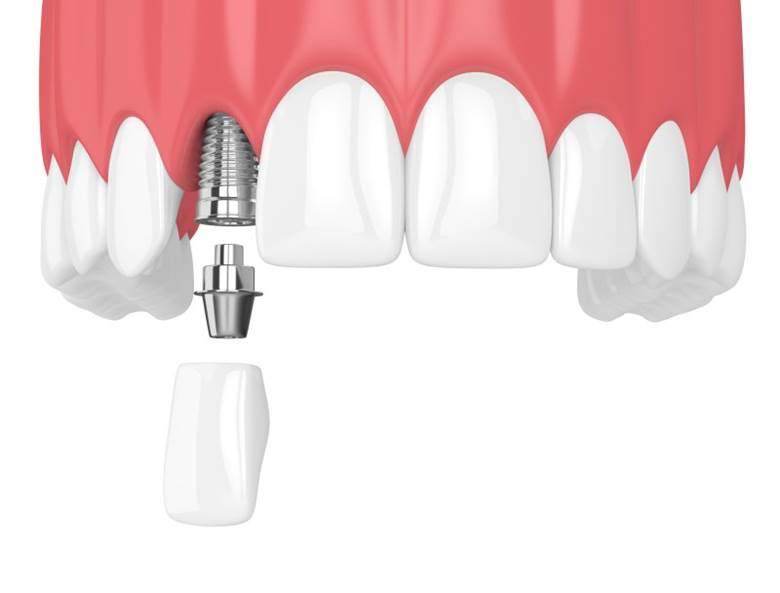
Replacing a single missing tooth with a dental implant is fairly straightforward. We vertically insert the titanium post within the empty space and top it with a personalized dental crown. Compared to a dental bridge, which requires that the two adjacent teeth are filed down, this approach is much less invasive.
Missing Multiple Teeth
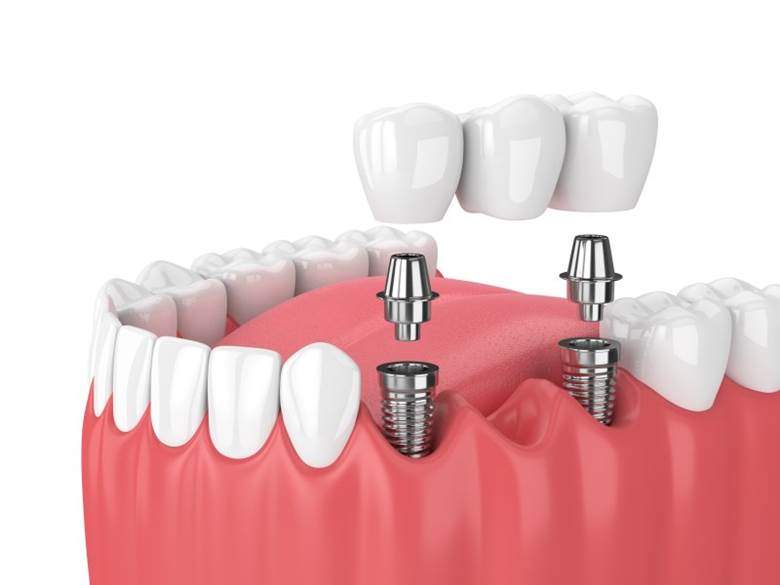
Instead of replacing each individual tooth with its own implant, a small number of posts can anchor a bridge (if the missing teeth are consecutive) or a partial denture (if they’re located throughout an arch). This solution is not only more cost-effective, but it also creates more stability compared to traditional bridges and partials.
Missing All Teeth
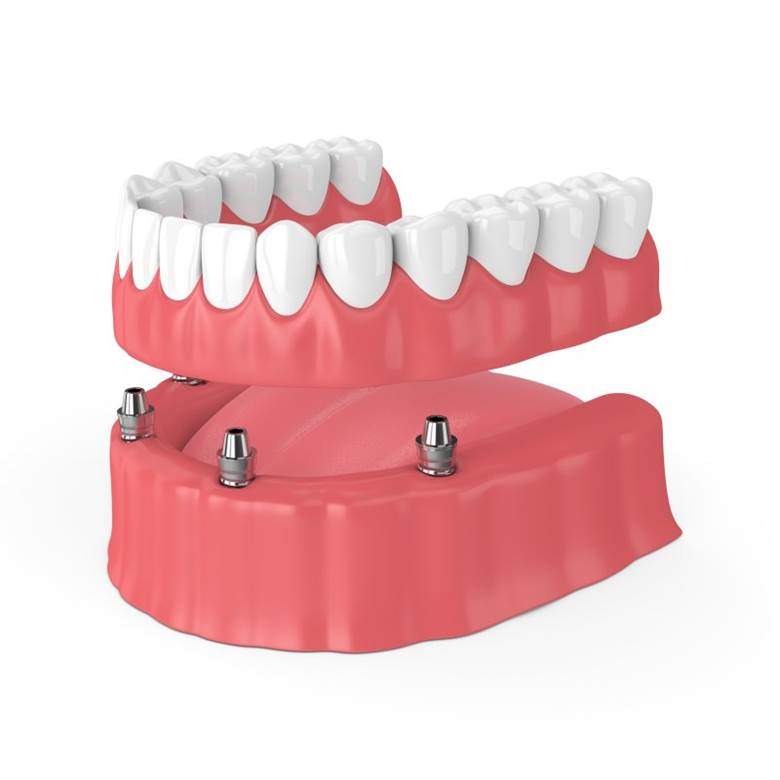
Even full-arch tooth loss can be undone with dental implants. By positioning just four to six implants at strategic points along the jaw, we can attach a full denture that sits in place much more securely than traditional dentures. Since implant dentures don’t slip around, they let you eat your favorite foods as effortlessly as you did before tooth loss.
Understanding the Cost of Dental Implants
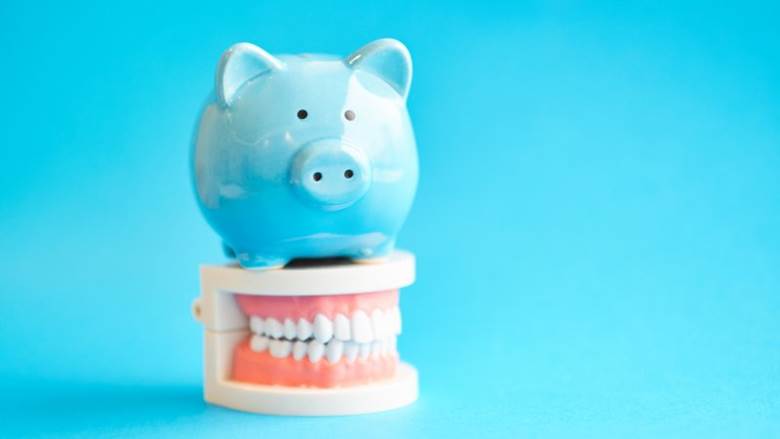
Every patient has different needs. One person may only have a single missing tooth while another has lost an entire arch of teeth. As such, the amount you pay for dental implants can vary dramatically based on your circumstances. Our team will create a reliable estimate for you, and we’ll make sure that you’re able to get the treatment that’s right for your smile without putting too much strain on your bank account. Below are a few things to keep in mind when thinking about the cost of implants.
Preliminary Treatments & Dental Implant Surgery
Sometimes you might need to have a few preliminary treatments done before you can receive dental implants. For example, bone grafting may be necessary if there’s not enough bone in your jaw to support implant posts. While preliminary procedures do typically add to the overall cost, you can usually expect them to be partially covered by dental insurance.
Implant surgery has its own cost to consider. The location of the surgical site and the type of sedation needed can affect how much you need to pay for the treatment. We place dental implants in-house, so you won’t have to worry about being billed by a separate practice.
The Parts of Your Dental Implant
When estimating the cost of the dental implants themselves, we will need to factor in:
- The number of implants needed to replace all of your missing teeth.
- The type of restoration that your dental implants will support.
- The material used to make the implant posts.
- The manufacturer that we receive your implants from.
We can go over each of these factors in more detail during your initial consultation; don’t hesitate to let us know if you have a question.
How Dental Implants Can Save You Money
On the surface, dental implants cost more than traditional dentures and bridges. However, they can also last for decades or even a lifetime with the right maintenance. That means you won’t need to pay for a replacement every 10 years or so. Also, since dental implants can be brushed and flossed like natural teeth, you don’t have to worry about buying special solutions to take care of them.
Does My Dental Insurance Cover Dental Implants?
Many dental insurance companies classify dental implants as a cosmetic treatment and thus won’t help pay for them. That said, oftentimes they will still cover parts of the final restoration as well as certain preliminary treatments. We can go over your insurance policy with you to see what benefits are available to make your new teeth more affordable.
Making Dental Implants Affordable
We gladly accept a wide range of dental insurance plans and can file any necessary claims on your behalf. We also offer flexible dental payment options and will work with you to help you fit the dental implant process into your budget.
Maintaining & Caring For Your Dental Implants

Dental implants are the most effective and long-lasting solution for replacing missing teeth. However, you can only expect to enjoy their results depending on how well you take care of them. For this reason, our team at LG Dental Centre is happy to offer several tips on dental implant care in Toronto and making the most of your fully restored smile. By practicing a proactive approach, you can ensure your restorations last a lifetime! Read along or give us a call if you want to learn more today.
Make Oral Hygiene a Priority

One of the most important ways to preserve your dental implants is to practice proper dental hygiene. This will effectively prevent harmful bacteria from attacking your soft tissue as well as causing further tooth or bone loss. Without it, you can also increase the risk of damage or decay in your healthy, natural teeth. To avoid these complications, make sure to brush twice daily for two minutes, floss at least once or after every meal, and rinse with mouthwash to keep your dental implants and pearly whites in pristine condition!
Eat a Healthy Diet

Having an occasional candy bar or a piece of cake isn’t bad. However, frequently consuming a diet consisting of starches and sugars can be detrimental to your dental implants and overall health. To make the most of your fully restored smile, try switching these meals out with fruits, veggies, dairy, leafy greens, and lean proteins. This will help improve both your tooth enamel, gum health, and jawbone tissue. Be sure to choose foods that are high in calcium and vitamin C to encourage a healthier environment for lasting dental implants.
Break Bad Habits

Certain habits can be harmful to your enamel and dental implants—such as smoking, chewing on hard objects, biting your fingernails, or using your teeth as tools. To prevent ruining these essential restorations and putting you at risk of needing additional treatment, it’s best to avoid or quit these tendencies. If you must chew on something, then you should try sugar-free gum as a safer and healthier alternative!
Protect Your Dental Implants
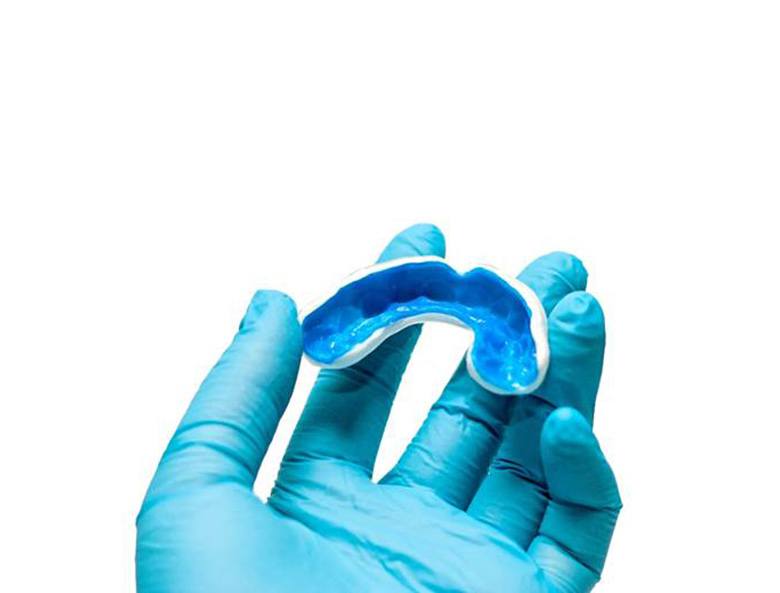
Do you tend to grind your teeth when you sleeping or stressed? Do you enjoy playing contact sports that can potentially damage your pearly whites? If so, you might consider investing in custom-made oral devices to protect your smile. Our team can offer athletic mouthguards or nightguards for bruxism to keep your tooth enamel and dental implants safe. These can also help you avoid jaw discomfort or TMJ disorder, promoting a more comfortable smile in the long run.
Schedule Regular Dental Checkups

Other than brushing, flossing, and rinsing your teeth daily, scheduling routine checkups will be essential for dental implant care. By visiting us every six months or sooner, we can examine your mouth and the integrity of your restorations. We’ll also be able to provide treatment for any developing issues we might detect. This way you can avoid more serious oral health issues from even starting, saving you time and money from costly treatments. Feel free to contact our staff if you’d like to schedule a checkup for your dental implants!
Dental Implant FAQs

Ready to say goodbye to the gaps in your smile? If so, you may be thinking about getting dental implants in Toronto. Since it’s a major procedure that requires oral surgery and the placement of multiple implants, it’s completely normal to have a few questions before committing to anything. At LG Dental Centre, we want you to be as well-informed as possible so you can confidently move forward with your decision to get implants. Below, we’ve decided to answer some of the most common questions we get from patients about this life-changing tooth-replacement service.
How Long Do Dental Implants Last?
On average, dental implants are expected to last well over three decades with proper care and maintenance. However, the exact lifespan can vary depending on individual factors like oral health, lifestyle, and dental hygiene. The good news is that caring for your implants is as easy as caring for natural teeth. Brushing twice a day, flossing daily, and rinsing every day with an ADA-approved mouthwash are excellent practices that’ll help your newly rebuilt smile last as long as possible. It’s also a good idea to avoid poor habits like smoking, chewing on non-food items, and using your teeth as tools.
Does Getting Dental Implants Hurt?
Not at all! Before your procedure, we’ll numb your mouth thoroughly to ensure you have a comfortable experience. Also, the jawbone doesn’t have many nerve endings, which means you’re less likely to feel pain there. In addition to a local anesthetic, you’ll also receive dental sedation to further lower your body’s ability to register pain.
Keep in mind that your mouth may feel sore for a few days following your oral surgery. Luckily, you can easily manage your discomfort by taking over-the-counter pain medication, using cold compresses, and diligently following your dentist’s aftercare instructions. If your symptoms worsen, call us right away for assistance.
Am I Too Young to Get Dental Implants?
Believe it or not, most people don’t have fully developed jaws until young adulthood. If dental implants are placed before then, it can interfere with bone development and possibly lead to complications. For that reason, many dentists will refuse to place implants in patients younger than 18.
Can I Get Dental Implants If I Smoke?
It’s certainly possible for smokers to get dental implants, but they’re at higher risk of experiencing implant failure. Smoking and chewing tobacco can cause dry mouth, which delays healing and could interfere with osseointegration (the natural process that allows the implant to fuse with the jawbone). It can also dislodge the blood clot forming over the implant site, leading to a painful complication known as dry socket. That’s why smokers are strongly encouraged to quit the habit at least two weeks before the procedure and wait to resume for at least two to three months afterward. Of course, it’s best to kick this habit for good if possible.